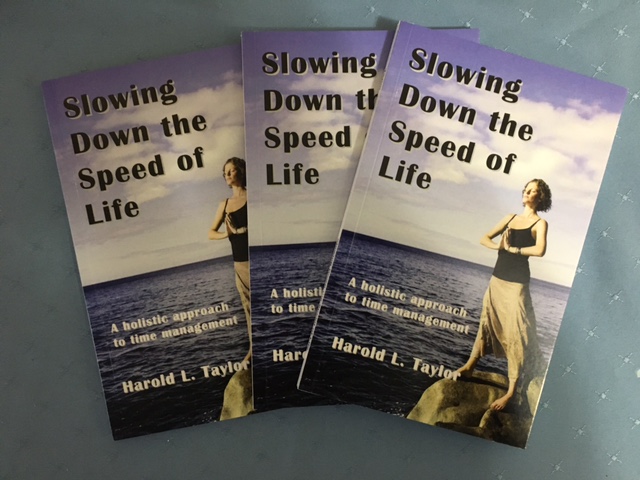A Time Management Article by Harold Taylor
He was multitasking, of course, and utilizing idle time by texting or playing computer games, or relaxing, or doing what he loved, or whatever. But the answer I was looking for was “He is robbing his son of his future memories.”
We should not judge others on how they spend their time. It’s their choice. Perhaps he could have been interacting with his son in a more meaningful way. That’s up to him. But one thing he was not doing was creating memories for his child.
For something to be remembered, it must be memorable.
In my book Slowing Down the Speed of Life, originally self-published in 2010, I explained why life seemed to be passing faster than ever, and even faster as you get older. One reason for this is that if you do not remember something, as far as the brain is concerned, it never existed, and so that chunk of time is not in your memory bank. I do not remember sleeping over 175,000 hours during the first 80 years of my life. Those hours are not even recorded by my brain – even though my brain was active all that time.
If I had played computer games for 175,000 hours, 80 years later I would not have remembered much of that time either. Our brain is too smart and too energy-conscious to record all those mundane or repetitive activities. And if part of my life is missing from my memory, no wonder time seems to fly by.
The brain is very efficient; it only records things that are worth remembering – those things that excite you, and that you obviously want to remember. Things that stand out and are not simply repetitions of the same boring activity.
One of the things that the digital age has changed for many people is how they spend time with their children. For example, we used to play catch with a baseball with our kids, or ball hockey, play board games, such as snakes and ladders or card games or crokinole – all things which allowed us to interact to a certain extent with them. We laughed a lot. The activities involved emotions and action, elicited excitement, and had a goal or purpose, such as building a relationship with children or others.
Now we tend to watch TV together, or more likely, spend most of our family time “doing our own thing” with our smartphones or other electronic devices.
I am not saying whether that’s good or bad, although I do have my own opinion, but it is different, and is not conducive to forming memories. Time will seem to have sped by very quickly, leaving fewer memories and therefore a seemingly briefer life. Your past consists of memories that you create. The more complete your memories, the longer the perception of your life.
This year, I have reprinted, with minor updates, my self-published book, Slowing Down the Speed of Life: A Holistic Approach to Time Management, originally published in 2010. I believe it is more relevant than ever. It explains why time seems to go faster as we grow older and describes ten things that we can do to slow down the perceived passage of time.
This would make an excellent Christmas gift for a family member or friend – the gift of time. For the month of November and December, there is free shipping anywhere in Canada and the continental U.S. The book itself is $21.95 CDN. And there are no added taxes.
At our website, taylorintime.com, there is a detailed description of this book including the contents page and introduction. To view it, click here.
Or simply download a PDF of it at our website for only $4.95 CDN from the “Download Products” section of our “Shop” area by clicking here.
Successful People Read. A Lot.
What do Warren Buffett, Mark Zuckerberg, Elon Musk and Oprah Winfrey have in common? They all read - a LOT! If you want to be successful you need to read. We have over 30 short ebooks designed to get you booked up fast!


